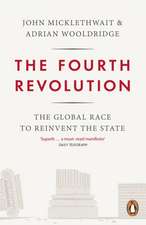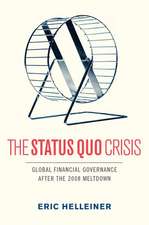Industrial Poverty: Yesterday Sweden, Today Europe, Tomorrow America
Autor Sven R. Larsonen Limba Engleză Hardback – 29 sep 2014
| Toate formatele și edițiile | Preț | Express |
|---|---|---|
| Paperback (1) | 312.43 lei 6-8 săpt. | |
| Taylor & Francis – 19 ian 2017 | 312.43 lei 6-8 săpt. | |
| Hardback (1) | 766.12 lei 6-8 săpt. | |
| Taylor & Francis – 29 sep 2014 | 766.12 lei 6-8 săpt. |
Preț: 766.12 lei
Preț vechi: 1028.55 lei
-26% Nou
Puncte Express: 1149
Preț estimativ în valută:
146.60€ • 156.76$ • 122.23£
146.60€ • 156.76$ • 122.23£
Carte tipărită la comandă
Livrare economică 17 aprilie-01 mai
Preluare comenzi: 021 569.72.76
Specificații
ISBN-13: 9781472439321
ISBN-10: 1472439325
Pagini: 216
Dimensiuni: 174 x 246 mm
Greutate: 0.56 kg
Ediția:1
Editura: Taylor & Francis
Colecția Routledge
Locul publicării:Oxford, United Kingdom
ISBN-10: 1472439325
Pagini: 216
Dimensiuni: 174 x 246 mm
Greutate: 0.56 kg
Ediția:1
Editura: Taylor & Francis
Colecția Routledge
Locul publicării:Oxford, United Kingdom
Recenzii
’Larson's book shows that the United States will have a very grim fiscal future if lawmakers don't reform entitlements and avoid the mistakes of Europe's failed welfare states.’ Dan Mitchell, Cato Institute, USA ’Dr Larson’s book title should send a chill up the spine of policymakers all over the world. Industrial Poverty explains how preservation of the welfare state and its culture of dependence is setting the stage for the world to become poorer for everyone. While there is still room to debate details, Dr Larson’s shot across the bow must be heeded to rebuild policies that lead to growing prosperity.’ Byron Schlomach, Director of Center for Economic Prosperity at the Goldwater Institute, USA
Notă biografică
Sven R. Larson is senior fellow in economics with the Wyoming Liberty Group, an American think tank. His research covers many areas of economics, including fiscal policy, the welfare state and the application of economic freedom. He earned his PhD at Roskilde University, Denmark, and his doctoral thesis, Uncertainty, Macroeconomic Stability and the Welfare State, was published by Ashgate in 2002. He has written three books about the welfare state, entitlements and how to reform big spending programs. His research has been published by several think tanks and his advice is often sought by political candidates.
Cuprins
Chapter 1 The Nature of the European Crisis; Chapter 2 Sweden; Chapter 3 Industrial Poverty; Chapter 4a Europe in 2012; Chapter 4b Europe in 2012; Chapter 5 Can Austerity Work?; Chapter 6 Way Forward;
Descriere
Conventional wisdom says that Europe’s crisis is a financial crisis. But is this really the case? In Industrial Poverty, economist Sven R. Larson, challenges this view and suggests instead that Europe is in a state of permanent economic decline. Using Sweden in the 1990s as an example, he shows how a welfare-state crisis combined with the wrong kind of austerity policies replaces prosperity with industrial poverty. Today, Europe is going through the same transition into industrial poverty. Tomorrow, it could be the United States, unless Congress and the President take decisive action against the runaway budget deficit.















